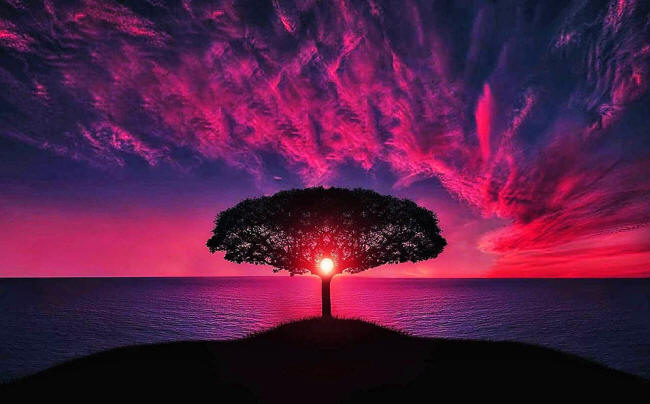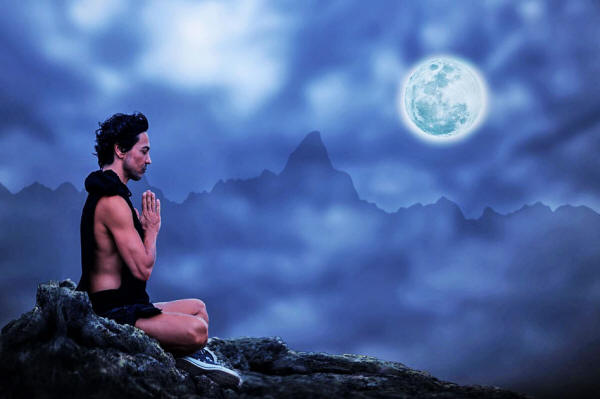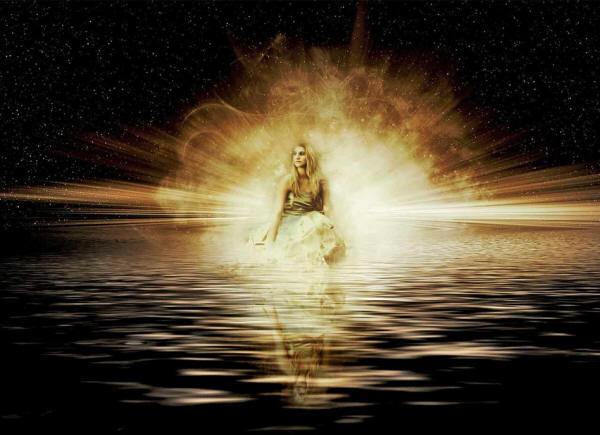|

by
Mateo Sol
September
11, 2019
from
LonerWolf Website
Spanish version

Self-realization
is one of those
phrases
that we hear on
the spiritual path
that goes in one
ear and out the other.
We don't give it
much thought,
yet it's at the
very heart
of EVERYTHING.
Without seeing Self-Realization as the ultimate goal of the
spiritual journey, our paths are vague, blurry, and disjointed. We
don't really know why we're doing what we're doing.
And if we do have some
fabricated reason, we never feel truly satisfied:
everything we obtain,
all the spiritual brownie points we collect, feel empty and
ultimately disappointing.
In fact, when we lose
sight of the importance of Self-Realization, our spiritual paths are
nothing but one distraction after another.
We become spiritual consumers, dabbling here and there in
attractive spiritual "products," without ever really diving deep.
I call this Rabbit Hole Spirituality:
like
Alice in Wonderland, we're
constantly falling into endless rabbit holes of new trends,
exciting practices, and sparkly feel-good philosophies.
But the reality is that
we're lost in the superficial, and eventually, something new will
come along and catch our eye, and off into another Rabbit Hole we'll
fall.
Thankfully, there are paths out there that are aligned with a deeper
form of spirituality - and all of them lead to Self-Realization.
If you're not quite sure what the hell Self-Realization is, or how
to experience it, stick around.
What is
Self-Realization?

There are two definitions of Self-Realization:
According to various
Western psychological and philosophical traditions, self-realization
is,
the fulfillment of
our personal potential in life.
Essentially, it's being
all that we can be in an unlimited, expansive sense.
However, according to
Eastern spirituality, Self-Realization is,
the knowledge and
embodiment of our True Nature or the Higher Self beyond the ego.
Here we have two
strangely conflicting definitions from the East and West.
Which definition is correct?
Actually neither definition is right or wrong:
both are equally
relevant as they uphold each other...
I'll explain why next.
The 3 Shamanic
Realms of Self-Realization
Self-Realization is not so much one big lights-and-glamour moment as
it is a slow and steady process.
This process occurs
within the three realms of existence:
-
The Middle World
-
The Lower World
-
The Upper World
Using shamanic
terminology,
-
The middle world
is the realm where we live everyday life. This is the realm
where we go about our daily existence with family, friends,
and work colleagues.
-
The lower world
is the downwards and inwards realm where everything hiding
beneath the surface dwells. This is the realm of thoughts,
feelings, instincts, dreams, unconscious wounds, and at a
core level, the soul.
-
The upper world
is the upwards and outwards realm where we transcend the
body, mind, and soul and enter the immaterial, eternal
Spirit that permeates all layers of existence.
Each realm has a
purpose…
Within each realm there is a task for us to fulfill:
-
In the middle
world, the task is
ego growth
-
In the lower
world, the task is
soul embodiment
-
In the upper
world, the task is
spirit realization (also
known as Self-Realization)
As depth psychologist
Bill Plotkin writes,
Ego growth, soul
embodiment, and spirit realization are equally vital to growing
whole.
Although all three
components can be engaged concurrently, there is a natural
sequence to their unfolding:
ego growth is the
foundation upon which soul embodiment rests, and the latter,
I believe, most effectively galvanizes spirit realization.
Here we see that all
three realms build on top of, and support, one another - the
ultimate goal being Self-Realization.
The difference
between self-realization and Self-Realization…
So here we see there are actually two types of Self-Realization.
-
The West promotes
the realization of the self's (ego's) fullest potential.
This process occurs within the middle and under world realm.
And some Western
schools of psychology, such as those that adhere to Carl
Jung's philosophies, promote soul realization (also known as
the individuation process).
-
The East promotes
the realization of the Self - that is, liberation from the
small fabricated self (ego), and the embodiment of one's
Higher Self or True Nature.
This is an upper
world path, a path that transcends the personal ego and
soul, and unites us with the Absolute, Unchanging, and
Eternal Spirit.
This is the path
of enlightenment.
Most Western and Eastern
schools of thought ignore or deny the importance of all three paths
working together in unison.
But they are all
essential paths to embrace so that we can experience true
Self-Realization - just as a tree needs roots, a trunk, and branches
to be whole.
The 9 Stages
of Spiritual Self-Realization

And should you choose to devote yourself to the ongoing journey of
self-realization, you will develop a tremendous sense of respect for
who you really are.
It is only then that you
will come to appreciate the full depth of meaning in the advice:
"This above all: to
thine own self be true."
Michael A. Singer
As I mentioned
previously, Self-Realization is not so much one great big moment as
it is a gradual process of unfolding.
(However, it must be noted here that for some rare individuals,
Self-Realization does come as one big moment. But for the vast
majority of us, it's a slow and steady process.)
Below you'll find the nine stages of spiritual Self-Realization:
from the beginning of the journey, all the way to the end. Please
note that Self-Realization is not necessarily (and
often isn't) a linear process.
We often experience a
spiral of unfolding and transformation, and it's common to move
forward and backward...:
1.
Self-Awareness
At the beginning of the journey is the dawning of
self-awareness.
This may occur
sporadically as a result of temporary moments of introspection
or as an entire spiritual awakening. Self-awareness is when we
become aware of ourselves (from an ego-based standpoint) and how
we interact with the world.
Those who are self-aware move away from their previous
psychological ignorance (also commonly referred to as "being
asleep") and into greater self-consciousness.
This can be a painful
period as we take an honest look at our thoughts, habits,
choices, and ways of relating to the world. Often we don't
like what we see.
Thus, we either numb
ourselves out of denial or enter the path of self-growth (also
known as the spiritual path).
2.
Self-Exploration
After the shock of awakening to more self-awareness, we're
driven by the desire to explore ourselves more:
this is the journey of self-exploration.
Self-exploration is fuelled by a mixture of curiosity ("who am I
really?") and dissatisfaction ("I can't believe I
did/said/believed that!").
We want to find out more about
personalities and understand our authentic place in life.
Self-exploration often occurs in the middle world (the realm of
everyday life) and the purpose of it is to uncover how we think,
feel, and behave.
To get answers, we
seek to gain knowledge and understanding of ourselves through
books, workshops, films, personality tests, and other
psychological and spiritual practices.
3.
Self-Discovery
Once we start dabbling in the world of self-exploration, we
eventually experience self-discovery, which is what happens when
we dig deep underneath the surface of ourselves.
Self-discovery occurs when we move from the "what?" to the
"WHY?"
While the previous
stage (self-exploration) deals with what we like/feel/do/think,
self-discovery deals with why we like/feel/do/think everything
that emerges inside of us.
In this stage, it's common to begin various forms of inner work
that get to the root of our core selves.
4.
Self-Understanding
Self-understanding is a crystallization of the previous three
stages:
it's a deep
understanding of the dynamics and workings of our ego
selves.
People who have
reached this stage have a thorough and multi-layered
understanding of the origins and reasons why they think, feel,
and behave the way they do.
Not only have they
explored their conscious ego, but they've also explored their
unconscious mind to meet their
shadow selves and other buried
core wounds.
Self-Understanding is a lower world path that goes downwards and
inwards, touching and revealing the very nature of our souls.
5.
Self-Love
Next is self-love:
the stage where
we are filled with compassion for ourselves and all that
we've been through.
As a lower world
path, self-love is what happens when we tap into the fundamental
nature of our heart and soul:
love.
When we love
ourselves, we are fuelled by a deep understanding of ourselves.
In fact, without the
previous stage (self-understanding) it's almost impossible to
practice self-love because we don't know what or why we do,
think, and feel what we do.
Learning how to love ourselves means that we stop punishing
ourselves, start nurturing ourselves, and start experiencing
greater self-esteem, self-confidence, and self-forgiveness.
6.
Self-Transformation
In this stage, we begin to shed our old and limiting habits,
perceptions, and compulsions that were created by the false self
(ego) and transform into the most authentic version of ourselves
possible.
When we experience self-transformation, we enter a death and
rebirth process that can feel uncomfortable and destabilizing at
first.
But ultimately, any
change we undergo is liberating.
In other words,
we become more soul-centered instead of ego-centered, and we're
more comfortable in our skin.
Thanks to the previous five stages, we're able to make space
for new growth to occur. Like a butterfly emerging from its
cocoon, we feel more expanded, free, and grounded.
7.
Self-Mastery
As a culmination of stages 1-6, this stage is about reaping the
rewards of a stable and well-adjusted ego.
Psychologist Carl
Jung referred to this stage as individuation, that
is, becoming a whole human being who is connected and aligned
with the soul.
Self-mastery is just that, mastering the false self (or ego) -
but not with tyranny or a domineering stance. Instead, mastering
the false self is done with love and understanding.
Instead of being slaves to our egos, we live from the heart and
soul, and our egos are yielding and in service to our souls.
When we experience self-mastery, our inner and outer worlds are
balanced, and we become the Kings or Queens of our own middle
worlds (everyday life) and lower worlds (inner life).
We are
self-contained, calm, perceptive, wise, compassionate, and
lighthearted.
8.
Self-Transcendence
Next is self-transcendence which is where we start entering the
world of Spirit (or the upper world).
When we walk the path of self-transcendence, we are seeking to
move beyond our limited egos and attachment to our souls, and
become One with the Divine.
The desire to self-transcend may come naturally throughout time
(as a result of diligently walking the spiritual path), through,
-
sudden
mystical experiences
-
profound
transpersonal insights
-
or a deep
inner calling to taste ultimate freedom...
Common
self-transcendence paths and practices out there include,
-
meditation
-
yogic
disciplines
-
mystical and
higher consciousness traditions (Sufism, Gnosticism,
Taoism, Buddhism, etc.)
-
self-inquiry
-
non-dual
teachings
-
contemplation,
...and so forth.
9.
Self-Realization
At last, we come to Self-Realization.
What can be said
other than the fact that Self-Realization can be sought and
worked for, but ultimately, it is a gift from
Life itself...
Self-Realization occurs when we stop identifying with the
limited ego and attaching to the soul, and instead recognize
ourselves as one and the same as the Divine.
Moving past a sense
of "me," "mine," and "I am ___," (aka. the inner stories
fabricated by our illusory selves) we come to embody what is
referred to as,
-
Christ
Consciousness
-
Enlightenment
-
Buddhahood
-
Non-Dual
Awareness
-
Oneness...
Other names for this
sacred experience are,
...and so on.
When we experience Self-Realization, we have seen through the
insubstantiality and impermanence of the ego (this can be
experienced through meditation), the dreamlike nature of
thought, and the illusion of attachment to all phenomena, and
into the vast, spacious, and eternal presence that exists
everywhere.
In this stage, we are free from suffering, free from fear, and
free from all separation.
What remains is a
pure radiance of being, a total union with Life, an experience
of endless love, connection, understanding, and openness to
existence.
How to
Experience a Taste of Self-Realization

Self-realization is a journey that could take you a few
years, decades, or most commonly, an entire lifetime (or longer)...
But it is a sacred and
worthy path that is worth every bit of your time, effort, sincerity,
and dedication. Ultimately, it is the path of enlightenment, the
path of freedom, and the path of love.
What could be better than
that...?
Now that we've explored what self-realization is, and the nine
stages, how can we taste - even just briefly - this experience?
Here are some methods and practices that will likely help you dip
into this life-changing experience (although nothing is ever
guaranteed):
-
Long stretches of
meditation (45 minutes or more per day) - keep in mind that
it's important to work up to this goal, especially if you're
a beginner
-
Plant medicine journeying
(with ayahuasca, peyote, mescaline, psilocybin mushrooms,
marijuana, etc.) - if you have a mental illness, I recommend
talking to a professional therapist beforehand, otherwise,
this is an amazing path that must be approached with clear
conscious intention and respect
-
Entering altered
states of consciousness (such as through a
trance state,
lucid dreaming, breathwork,
self-hypnosis) - remember to be gentle with yourself and go
slowly
-
Nature immersion - try
spending long periods of time in nature (1+ hours),
particularly in wild and untamed areas that aren't visited
by people
I hope you now have a
deeper understanding of Self-Realization.
Remember that we often
move forward and backward on the path:
it's not linear...
Instead, it's a
process that ebbs and flows, waxes and wanes, and moves in a
spiral pattern...
| 




